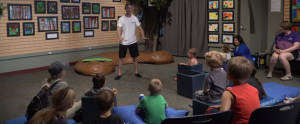August 2024 Blog: Spotlight on Development: The Power of Theatre for Young Children
The anticipation as the lights go down and the audience begins to hush, the thrill of getting that perfect laugh from a line, the rush of hearing that same audience roar with applause at the end of a show. These are all moving and exhilarating moments for a performer, but some of the most important moments in my theatre teaching career have came in smaller spaces, like Kohl Children’s Museum’s Spotlight Studio. Exposure to theatre at all ages is valuable, but exposure in the early childhood years can be extraordinarily valuable for a child’s development and create learning experiences that spark imagination and curiosity for the rest of their lives.
The list of benefits that theatre experiences offer for our young friends is exhaustive, but here are five of my favorite things that theatre provides for its youngest students and some of the activities I use to accomplish it:
1) Physical Exploration
“Make yourself as BIG, BIG, BIG as you can! Now TEENY TINY, TEENY TINY, TEENY TINY!” Is something you will hear quite often in one of my theatre sessions at Kohl Children’s Museum. It’s a great way for little ones to warm up their bodies and taps into something they already want, to be bigger. As they stretch and bend to accomplish the goal, they are also becoming more aware of how their body moves and how all of their body parts work together. “Now let’s be animals in the woods! Who can be a Bunny?” From twitching our noses and pretending to eat some lettuce, to hopping from place to place the youngest students begin to expand their capacity for more complex dexterity and balance. Also, all of that hopping is quite the physical workout.
2) Communication
The depth with which theatre training can impact a young students ability to communicate is often underrated. Starting with simply feeling the difference between a “Buh” and “Puh” sound for example. Exploring the sounds that letters make, especially the sounds where your mouth makes similar motions, is one of my favorite tools to warm up our voices. It is also one of the best tools to illustrate how “the lips, the teeth, the tip of the tongue” (a favorite tongue twister of my students) all work together to create specific consonant sounds.
Once we add emotion to any activity we also add body language to our pallet of communication. This gives students the opportunity to show feeling with their body, not only on stage or in games, but it also refines their ability to show emotion in their day to day lives.
3) Collaboration
In performances, the cast and crew all work together to tell a story. They learn to rely on each other for lines, cues and emotional give and take. In theater games at the museum, the sheer joy of watching a group of young students work together to add the next piece of the puzzle to create an environment is amazing. “What other animals can we find in the forest?” Sometimes, this will expand into a fully improvised story created by the whole group. “A monster is in the forest?!?! Oh no!”
4) Problem Solving
In this safe environment, as each student starts to imagine what their body needs to do to become a bunny, the fundamentals of problem solving are beginning to settle in. “How do I make that sound?” When we introduced a “monster in the forest” that could be a problem. “How are we going to solve it?” Just about every good story has a problem at its core. Through creativity, trial and the freedom for error, these concepts of conflict management are fostered and will help the students through the rest of their lives. As they adapt to each scenario, story and scene, they are learning to adapt to the changing world around them.
5) Self Confidence
Going back to how I opened this blog, having a room full of people clapping for you can go a long way to boost your confidence, but even the smaller moments have an impact. Fear of speaking in public is one of the most common phobias. If we start learning how to perform in front of a group of peers at a young age, the confidence we have when presented with similar opportunities is invaluable. Business presentation? No problem. Class speech? Easy peesy. We also gain confidence with the sense of accomplishment we get when every performance closes and every theatre game ends.
My time at Kohl Children’s Museum has given me the opportunity to be surrounded by the infinite capacity of young imaginations every day. I know the tools they gain in our theatre sessions will offer them a more complex toolbox to grow and go wherever they want in life.

See you at the museum!
–Vito Gioia, Director of Visitor Experience